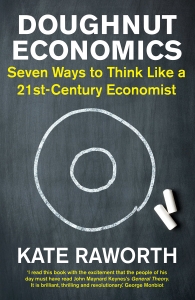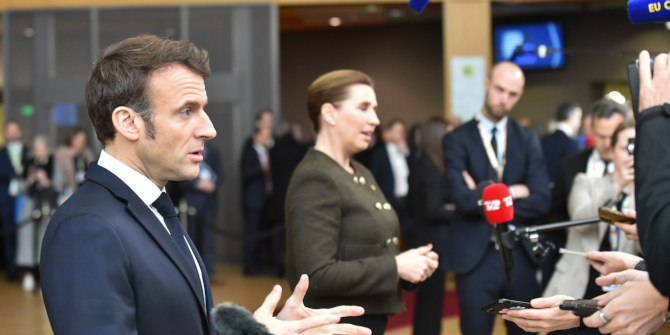In Doughnut Economics: Seven Ways to Think Like a 21st-Century Economist, Kate Raworth offers a new model for economics, based around the ‘doughnut’, which values human well-being and advocates for a ‘regenerative and distributive economy’. While the book holds multidisciplinary promise and Raworth draws upon appealing and evocative metaphors and examples to convey economic concepts in accessible terms, Maria Zhivitskaya remains unconvinced of the doughnut’s transformative potential.
If you are interested in this book review, you may like to listen to a podcast of Kate Raworth’s lecture ‘Doughnut Economics: Seven Ways to Think Like a 21-Century Economist’, recorded at LSE on 23 November 2017.
Doughnut Economics: Seven Ways to Think Like a 21st-Century Economist. Kate Raworth. Penguin. 2017.
One day economic historians might examine Doughnut Economics as an artifact of thinking that emerged as a result of the 2008 financial crisis, deriving its credibility from the fact that economics failed to predict it. Kate Raworth pursued an undergraduate degree in economics in order to set herself on a career path in an organisation such as Oxfam or Greenpeace, ‘campaigning to end poverty and environmental destruction’. However, she found that those issues she cared deeply about were overlooked by the academic study of economics and so, years later, she wrote Doughnut Economics: Seven Ways to Think Like a 21st-Century Economist to provide a ‘compass’ to help ‘policymakers, activists, business leaders and citizens alike to steer a wise course through the twenty-first century’. An ambitious aim.
The author positions this book as contrarian and revolutionary, and it dissects seven fundamental principles of economics that she feels need to be updated to make economics a useful discipline. Raworth explains that:
rethinking economics is not about finding the correct [school of thought] (because it doesn’t exist), it’s about choosing or creating one that best serves our purpose – reflecting the context we face, the values we hold, and the aims we have.
In her attempt to bring economics more up-to-date, as the subtitle of the book suggests, Raworth depicts humanity’s goals as a doughnut.
The doughnut has social foundation and human well-being in the middle, and is itself ‘the safe and just space for humanity’ and for a ‘regenerative and distributive economy’, surrounded on the outer edge by the ecological ceiling of ‘critical planetary degradation’. The overall target should be to remain within the doughnut to ensure that we neither fall into conditions of social inequality and suffer shortfalls, such as in water and food, nor allow growth to overshoot into threatening environmental collapse. In her words, this model ‘draws on diverse schools of thought, such as complexity, ecological, feminist, institutional and behavioural economics’. This multidisciplinary promise was the most appealing element of the book for me.

Image Credit: (Ferry Sitompul CC BY 2.0)
The book is neatly organised around the ‘seven ways to think like a twenty-first century economist’, which are listed on page 26. These principles are underlined by a broad assumption that economics as we know it doesn’t care about either humans or the environment, and therefore the first thing we should do is ‘change the goal’ from GDP growth to the doughnut. The second principle is ‘seeing the big picture’, where Raworth explains that the market is not self-contained, and that the economy is more embedded in society than some economists assume.
Raworth acknowledges the vast influence economics as a discipline has had on the way we think: in particular, the notion of the ‘rational economics man’, which she suggests we need to replace with ‘social adaptable humans’. To demonstrate how unreasonable the ‘rational economic man’ assumption is, she quotes a Wikipedia page that lists 160 cognitive biases. Her argument goes that due to the sheer number of these, economics as a discipline is unhelpful. That seemed like a weak argument to me, not least because Daniel Kahneman, who discovered many of these, won the Nobel Prize in Economics. Using his discovery as a way to demonstrate the weakness of the discipline seems unfair.
The fourth principle is that we need to ‘get savvy with systems’, and appreciate that the real economy doesn’t comply with the supply-demand equilibrium but is instead embedded in dynamic complexity. The fifth and sixth are ‘design to distribute’ and ‘create to regenerate’, as Raworth claims that the assumption that growth reduces inequality and facilitates environmental improvements is false. Finally, the seventh recommendation is that we should be ‘agnostic about growth’:
today we have economies that need to grow, whether or not they make us thrive: what we need are economies that make us thrive, whether or not they grow.
Not surprisingly, three of the seven principles claim that growth doesn’t lead to redistribution of wealth or environmental regeneration and is overall not a helpful goal, which is why Raworth suggests we should rather be redistributive and regenerative by design.
Raworth’s attentive choice of words throughout the book is very attractive: for example, she quotes George Lakoff who summarises the US Conservatives’ use of ‘tax relief’ compared to the US left’s ‘tax justice’, concluding that this subtle reframing ‘helped to channel public outrage and mobilize widespread demand for change’. Her book, too, demands change. Raworth goes all the way back to Ancient Greece to draw on Aristotle’s distinction between the terms ‘economics’ – the ‘practice of household management’ – and ‘chrematistics’ – ‘the art of acquiring wealth’ – to criticise modern economics as being all about the latter. The book is also peppered with charming anecdotes: for example, did you know that the popular board game Monopoly is derived from the original ‘The Landlord’s Game’?
Raworth suggests that ‘economists need a metaphorical career change: from engineer to a gardener’, which is a quote ironically inspired by Friedrich Hayek, who originally meant it in a laissez-faire kind of way. Raworth beautifully explains that gardening actually entails the hands-on creation of conditions necessary for success. However, while her metaphors are flowery and appealing, they do not offer any real policy advice about how to tackle the complicated issues she highlights. Instead, the book is full of statements such as ‘building diversity and redundancy into economic structures enhances the economy’s resilience, making it far more effective in adapting to future shocks and pressures’; and ‘it is far smarter to create economies that are regenerative by design, restoring and renewing the local-to-global cycles of life on which human well-being depends’. Practical policy questions, such as tackling the complexities of integrated environmental and economic accounting, are outside the scope of her idealistic vision.
Overall, Doughnut Economics is excellent at describing economic concepts in accessible terms, and could be read as an add-on to an introductory economics textbook. Raworth’s in-depth summary of climate change is very well argued and would be useful for challenging climate change denial: in this sense, the book is more about sustainable development than economics.
Raworth criticises economists and politicians for debating ‘economic efficiency, productivity, and growth […] while hesitating to speak of justice, fairness, and rights’, without providing tangible policy recommendations. She calls for bringing ‘humanity back at the heart of economic thought’, and criticises the likes of Harvard and the London School of Economics for promoting ‘research in what are known as the “top” journals, but those journals simply maintain the status quo’. Her plea is to change that and teach history and philosophy in conjunction with economics, which is a useful suggestion that more universities could take on board, perhaps borrowing from LSE’s curriculum for Economic History studies and Oxford University’s Politics, Philosophy and Economics course that has been taught there for almost a century. So, despite the book’s gloomy view of the current state of the world, perhaps not all hope is lost.
Please read our comments policy before commenting.
Note: This article is provided by our sister site, LSE Review of Books. It gives the views of the author, not the position of EUROPP – European Politics and Policy or the London School of Economics.
_________________________________
Maria Zhivitskaya
Maria Zhivitskaya completed a PhD in Risk Management from the LSE Accounting Department in 2015, worked for Goldman Sachs afterwards, and currently works for Prudential plc.


 Find this book:
Find this book: 

